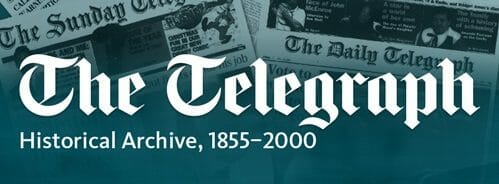With The Telegraph Historical Archive, 1855-2000 launching March 2016, we will be bringing you a series of essays from scholars featuring research case studies, enlightening biographies of key Telegraph figures, and more.
Dr James Nye is a Visiting Research Fellow at the Institute of Contemporary British History at King’s College London. His research focuses on the corrupt, scandalous reputation – deserved, or perhaps not – of the company promoter in the first few decades of the 20th century. In this, newspaper records are, of course, invaluable; specifically, the use of multiple newspapers, as ‘each journalist might record something different – a composite picture is reasonably likely to be much better than one that relies solely on The Times, however much it might be regarded as the principal paper of record’[1] .
The below is an excerpt from the essay, commissioned by Gale to explore the research applications of The Telegraph Historical Archive. To learn more, read the full essay or visit http://www.gale.cengage.co.uk/telegraph.
“Hooley, one of the most prolific and perhaps infamous of all the great promoters, was the subject of a quite marvellous and astonishingly revealing interview conducted by a Daily Telegraph writer. At his sensational bankruptcy hearing in 1898, Hooley caused an immense stir by revealing the details of his arrangements with his ‘guinea-pigs’ – the directors he had placed on the boards of companies whose flotations he arranged, and who were therefore in his pocket. For example, he revealed that he had paid Earl de la Warr £25,000 (the equivalent of £2.3m in 2010), which caused a general scandal and acute embarrassment for the nobleman in particular. Of topical interest were the revelations about Hooley’s dealings with the newspapers. A small sample of The Daily Telegraph’s report of his examination gives a flavour:

[The Official Receiver] Who is Mr Finch Hatton?
[Hooley] Brother of Lord Winchilsea. He was introduced to arrange with the evening papers not to pull the company to pieces. (Laughter)
[The Official Receiver] On the counterfoil of the cheque you have written ‘For quieting papers generally on pneumatics’. (Laughter) Can you name any of the papers?
[Hooley] He used to bring a list with the amounts required against them. The amounts varied from £25 to £100. One of those lists will be among my papers.
[The Official Receiver] What was this second payment of £2,000 to T.H. Davis?
[Hooley] For the same purpose.
[The Official Receiver] On the counterfoil you have ‘To square papers’. Can you name any of those papers?
[Hooley] The Pall Mall was one, The Financial Post another.
Hooley’s interrogation continued for column after column. One of the more scandalous revelations was the inclusion of Tower Hamlets MP and Financial News editor, Harry Marks, among the names to whom Hooley had paid substantial sums. The reason the Official Receiver was in a position to ask such unusually leading questions of Hooley is that the debtor had already effectively spilled the beans. He had decided as a public relations exercise to make a clean breast of his activities and, in an exclusive interview with The Daily Telegraph special correspondent six weeks earlier, had discussed the general necessity for bribery, and in particular in relation to the press…
The promoters offer good evidence of the need to consult several newspapers to develop a greater degree of confidence in press reporting. Indeed, the detailed reporting of Hooley’s bankruptcy hearing offers a good example. Although all of the major newspapers reported the hearing, they differed considerably; The Times’ ran to just 2,800 words, while The Financial Times’ coverage stretched to 11,800 . The Daily Telegraph’s account totalled 8,650 words, on the surface of it offering less information than The Financial Times. Not so, since a close comparison of the two offers myriad subtle differences, and any valid modern account would certainly benefit from the inclusion of The Daily Telegraph in its coverage, alongside material digitised earlier.”
Want to get a look at The Telegraph Historical Archive, 1855-2000? Register to receive free one-month trial access when the archive releases this month.
For more information about the digital resources featured in this artice, or to request a trial, please get in touch with us today.
[1] “Business, Bribery and the Broadsheets: Research Companies and Industry with The Daily Telegraph,” Dr James Nye, 2015; pg 1.
[2] The Daily Telegraph (28 July 1898), p. 5; compare The Times (28 July 1898), p. 14; Financial Times, (28 July 1898), p. 5. I am indebted to George Newkey-Burden of The Daily Telegraph for locating his paper’s account.
[3] The Times (28 July 1898), p. 14; The Financial Times (28 July 1898), p. 5.


